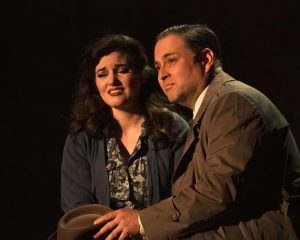
Avid theatergoers are probably familiar with Neil Simon’s Brighton Beach trilogy and also Harvey Fierstein’s Torch Song Trilogy. But how about Alfred Uhry’s Atlanta Trilogy?
During the late ‘80s and ‘90s, Uhry wrote three distinctly different plays, all centering on his colorful Georgian family, each Jewish in their own way. The most acclaimed on them is 1989’s Pulitzer Prize-winning Driving Miss Daisy, a simple, touching tale of Uhry’s grandmother growing old and overcoming her racial prejudice as she bonds with the African-American man hired to shuttle her about. And there is Parade, a musical account of a New York Jew, out of his element in Atlanta, falsely accused of assaulting and murdering a young girl at the pencil factory he manages.
Then there is The Last Night of Ballyhoo, a Tony Award winner from 1997, about an affluent Jewish family and an unexpected rise in antisemitism coming from an unusual source. Boca Stage has dusted it off and produced it now, a more conventional selection than the company usually offers, but quite timely in its resonances to contemporary events.
The Freitags — bachelor uncle Adolph, his widowed sister Boo and sister-in-law Reba, as well as their daughters, Lala and Sunny — all live under the same roof. They are Jews, but so assimilated that their living room is dominated by a decorated Christmas tree.
Ballyhoo begins nostalgically in 1939, as Atlanta is all atwitter over the imminent premiere of the movie Gone With the Wind. Such a unique event that will bring Hollywood royalty to Atlanta is topped only by the Ballyhoo Ball, the outstanding social event of the city’s Jewish country club. Both daughters are eager to attend Ballyhoo. Manic Lala projects a desperation about the occasion, while her more assured cousin Sunny looks forward to it, but keeps the event in perspective.
Meanwhile, of course, news of the simmering situation in Europe and the likelihood of world war is washing ashore, making the Germanic Freitags all the more eager to deny their ethnic heritage. As the play darkens in the second act, Uhry bitterly recalls the rise of prejudice. As the Jews were discriminated against by the Gentiles, the German Jews looked down their noses at Eastern European Jews. It is a catch-in-the-throat revelation that cuts through the play’s previously lighthearted tone.
Boca Stage’s artistic director Keith Garsson helms the production skillfully, even if not all of his seven-member cast seems capable of conveying the nuances of these characters. Standouts in the company include Shane Tanner as soft-spoken, put-upon Uncle Adolph, Rachel Whittington as poised beyond her years Sunny and Alex Bakalarz impresses as Joe, a New Yorker appalled by the Freitags’ eagerness to deny their religion and assimilate. On the liability side of the production ledger is Hannah Hayley’s Lala, whose screechy delivery rendered much of her dialogue inscrutable.
Still, Uhry’s script is well worth reviving and appreciating, for its unblinking view of his family’s roots and its reflection on the world today.
THE LAST NIGHT OF BALLYHOO, Boca Stage at Delray Beach Playhouse, 950 NW 9th St., Delray Beach. Through Sun., Nov. 3. $59-$69. 561-272-1281.